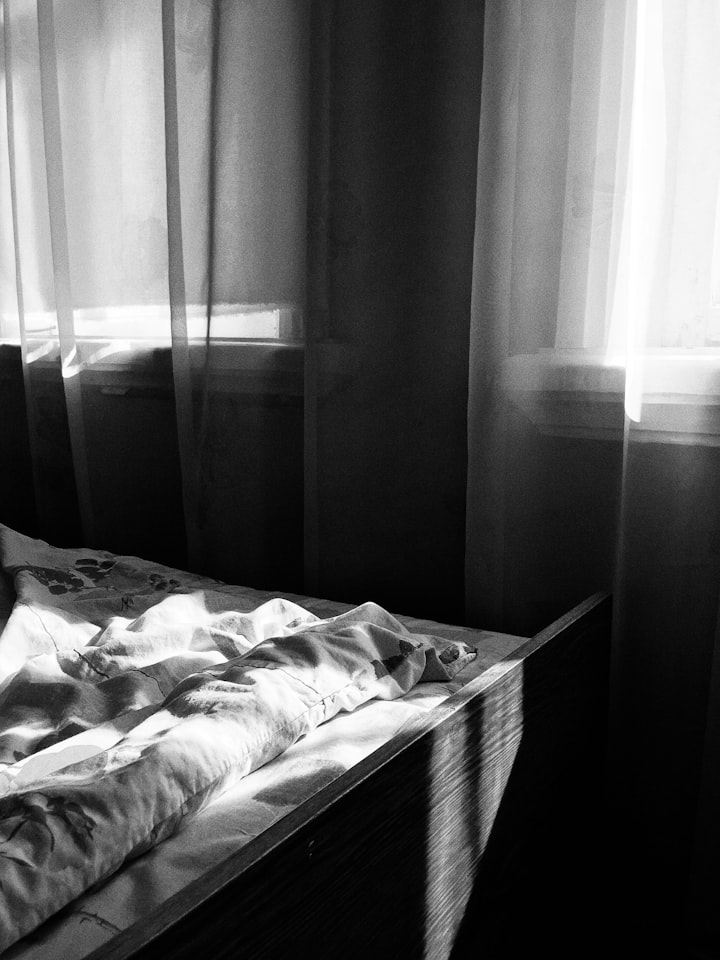
“This is a Jane Doe?” the man behind the desk covered in documents asked the woman behind the girl dressed in animal skins. The woman who was a social worker nodded.
The man who was a judge trained his eyes on the girl whose chin rested against her chest. “Who are you, young lady?” he asked. “What’s your name?”
She shook her head.
“You don’t have a name?” he asked.
She shook her head again.
“You’re not a young lady?” he asked.
She shook her head harder.
“Then what are you?” he asked.
“A book,” she said meekly.
“But you look like a little girl,” he said.
“Outside,” the girl who was a book replied.
“But inside you’re a book?” the judge asked and she nodded. He paused, thinking, then turned, removed a book from the shelves behind him, and flipped through it.
“Inside, books are full of words,” he said. “Are you full of words?”
She nodded again. He looked back to the book in his hand.
“Hmm, well, books have titles,” he said. “Do you have a title?”
“The Life of Man,” she said.
“But you’re not a man,” he said, you’re a little girl.” She shook her head once more. “No you’re not a little girl, you’re a book,” he corrected. The girl who was a book was silent.
“Many books tell stories,” the judge said. “Do you tell a story?”
The girl who was a book raised her head. When she spoke her voice had changed.
“My name is Thorgood Fishburne,” she began. “I have lived my entire existence in these northern woods, as did my parents before me...”
The judge interrupted. “Wait, your name is Thorgood Fishburne?” he asked, but she shook her head. “Is Thorgood Fishburne your father?” he asked, but again she indicated not. The judge thought for a moment.
“Is Thorgood Fishburne the name of your author?” he asked incredulously.
The girl who was a book nodded.
“I’m sorry I interrupted,” the judge said. “Please continue your story.”
“As for their parents, I do not know, since they did not record their own histories as I am doing here. I can neither read nor write, nor do I have the implements to do so even if I could, so I have determined to record my biography in this form, this living book, so that my own story will survive me. The material that I have found on which to inscribe my story—which is also, incidentally, the story of the reality of man as a species—is also too raw to have learned letters. Thus the book of my life and of all life will by necessity be a book of recitation rather than manuscription. An oral history rather than a written one.”
The face of the man who was a judge contorted in agony and the shoulders of the woman who was a social worker shuddered in sadness as the voice of the girl who was a book continued the narration of The Life of Man.
“From my earliest memories we have lived a simple life, dwelling in a cave like the cavemen of old. My parents often told me about how man lived in caves for a very long time before emerging to build false caves from which to dominate the world and one another. We saw these buildings only rarely. Once or twice a year we would make the week-long trek to the nearest village where we would scavenge certain items to store for winter or, when winter finally ended, to replace what had been broken or lost. My parents explained to me how, just as these false caves were fragile and illusory, so was the society in which people lived, pretending to work together while they were actually working to undermine one another. The people were, at every moment, at risk of being attacked or exposed, while nevertheless believing the thin glass windows which separated them from the reality outside would seclude and secure them. We both pitied and resented these townspeople. They had lost their connections to the world and themselves and lived in a fantasy world of unacknowledged misery. Their great failure forever threatened to encroach upon our own authentic lives…”
“Okay, you may stop,” the man who was a judge said to the girl who was a book. He ran his hands over his face and through his thinning hair, then turned to the woman who was a social worker.
“She needs real help,” he said to her, imploring. “Is Elana available?”
The social worker nodded and placed her hand upon the pelt-covered shoulder of the girl who was a book.
“I’m sorry, little book,” the judge sighed as the social worker led her toward the door, “I hope you find your way back to us.”
Before she was a book, the girl who would become a book was a child. After five years with her parents she was stolen away in the night and dragged for days, numb and afraid, deep into the woods to a distant encampment. Now, five years later, she was being moved again, but not dragged. Numbly, but not afraid. Now she was a book and books do not feel fear. They do not feel anything at all.
This time, however, she did not find herself in a cave in the woods with a grizzly-bearded beast of a man but on the porch of the home of a round, sweet-smelling woman who looked down at her with an expression that somehow reminded her of the story of the fawn, so she told it.

“I had only been on my own about a year when, out wandering and riddled with questions about how I could continue the life of man that my grandparents had started and my parents had shown me without a woman—an Eve to my Adam—I stumbled upon a doe drinking from a stream. I did not particularly need the meat or fur at the time, but I was in a mood and there was no surer way to get out of it than to focus on the hunt. I climbed silently up a nearby tree, took out my lasso and quickly snagged the deer. I leapt down from the branch, pulled the rope over it to hang my quarry, ran up from behind and grabbed its head. I slashed its throat and fell back, letting the feeling of strength and accomplishment wash away the questions of the day. That’s when I saw the fawn. It stood motionless downstream. I didn’t understand it. A deer should run. Animals flee, people chase. That is the great bargain of existence, the rules of the game. But this thing did not move, even when I crept towards it. I got all the way up to it and still it didn’t budge. So I sat next to it. I put my hand on its haunches and, strange as it may sound, it simply lay down, putting its head in my lap. I looked into its wide, terrified eye and felt something for which I still do not have a name. I held its head in my hands and its gaze in my eyes. Then I realized something. I took its head and, quickly and cleanly, twisted it, snapping its neck. That’s what it wanted, it wanted to die. Life was the game and it didn’t want to play it. Like the people in the town, it wasn’t up to the challenge. I did it a favor. But I didn’t skin it. Didn’t eat it. I left it there.”
The woman only nodded and said softly, “I hear you, little book, and I will think about that. In the meantime, won’t you please come in. I am Elana and this is your new home.”
Life with Elana was unlike life with Thor. Thor spoke at her, forcing her to memorize and repeat. Elana listened to her, even if all she had to say was what Thorgood Fishburne had dictated. In the woods she slept on the floor of the cave with a rope around her ankle. In Elana’s house she slept in a bed with a pillow beneath her head. The girl who was a book began to think of Elana as the woman who was a librarian.
One day the woman who was a librarian came to her. “There is a surprise for you at the door,” Elana said. “Don’t be afraid. No one will take you where you don’t want to go.”
Elana opened the door to reveal two people. When they saw the girl who was a book the man who had been her father fell to his knees and the woman who had been her mother ran to her and put her arms around her. But the girl who was a book didn’t do anything. She didn’t feel anything. Books don’t feel. They tell stories. For some reason this moment reminded her of the story of the firewood, so she told it. Then the people who had been her parents cried. Soon after that, they left.
A few days later the woman who was a librarian came to the girl who was a book. “I’ve brought you a present,” she said. “No book can tell the whole story. One book is never enough. There is always more to tell.” She handed the girl a small black leather notebook. “If you like, I will teach you the alphabet and you can learn to read and write and one day, if you want to, you can fill the blank pages of this book with your own story.”
The girl who was a book held the little journal in both hands. She opened it to see the clean, crisp, empty pages. She nodded to the woman who was a librarian...and a friend.
Weeks later the woman who was a librarian found the girl who was a book bent over her little black book, pencil in hand, meticulously writing small imperfect letters on the blank pages of her leather companion. She held the pencil tightly, pressing deeply against the paper as she carved the words “the LIF of man” uncertainly in her shaky script.
“Would you like me to help you get it out?” the woman who was a librarian asked the girl who was a book.
The girl nodded.
The woman who was a librarian led the girl who was a book to the room that was an office. She turned on the computer which sat atop the desk. “Okay, you can tell me the story and I will type it in this computer. When we are finished, we can print in on these papers. Are you ready?” she asked. “Let’s start from the beginning.”
“The Life of Man, by Thorgood Fishburne,” the girl recited with tears in her eyes. “My name is Thorgood Fishburne…”
They wrote together through the long, cold night. The blue light of the monitor shone constant in front of them, the yellow light of the fire flickered behind. In the morning the sun rose.
The girl who had been a book and the woman who had been a librarian sat in silence as the printer that had been inactive dropped sheet after sheet of warm, freshly-inked paper onto a growing pile of pages. When it was done, the woman who had been a librarian delivered the book that had been a girl to the girl that had been a book. She went back to the desk, picked up an envelope, and carried it over.
“By the way, little book,” she said, “a publisher has offered twenty-thousand dollars for the right to read this story. That’s a lot of money, but what you do is entirely your choice to make.”
The girl sat upon the floor, the newly printed pages sat upon her lap, the offer letter sat upon the pages.
“Call me Amanda,” she said, staring into the flames that rose above the artificial logs in the gas-fueled fireplace.

About the Creator
M. M. Sang
Professor






Comments
There are no comments for this story
Be the first to respond and start the conversation.